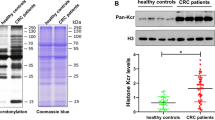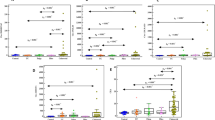Abstract
Purpose
It has been demonstrated that the alteration of human leukocyte antigen (HLA) class I expression frequently occurs in colorectal tumor. Previous studies mainly focused on the expression of HLA-A in tumor cells. The expression of HLA-A in peripheral blood mononuclear cells (PBMC) was unknown. To develop a non-invasive diagnostic method for colorectal cancer (CRC), this work investigated the expression of HLA-A mRNA in PBMC in patients with CRC.
Methods
Real-time quantitative RT-PCR was used to study the expression of HLA-A mRNA in PBMC from 48 patients with colorectal cancer, 38 patients with benign colorectal lesions, 20 patients with rheumatoid arthritis, 20 patients with esophageal cancer and 40 healthy individuals. Protein chip was utilized to detect the levels of serum CEA, CA 19-9, and CA 242 in all the cases. Overall results from the two methods were compared.
Results
The relative expression of HLA-A mRNA in PBMC was 1.11 ± 0.45 in healthy group, 0.81 ± 0.42 in benign colorectal lesion group, and 0.39 ± 0.34 in cancer group, respectively. The diagnostic sensitivity of HLA-A mRNA, CEA, CA19-9, and CA242 was 81%, 59%, 61%, and 63%, and their diagnostic specificity was 75%, 64%, 52%, and 67%, respectively.
Conclusions
The expression of HLA-A mRNA in PBMC from colorectal cancer group was significantly lower than those in both benign group and healthy group (P < 0.001). It could be potentially developed as a tumor assistant marker in future.



Similar content being viewed by others
References
Pasetto LM, D'Andrea MR, Jirillo A et al (2006) Stable disease in advanced colorectal cancer: therapeutic implications. Anticancer Res 26:511–522
Popat S, Zhao D, Chen Z et al (2007) Relationship between chromosome 18q status and colorectal cancer prognosis: a prospective, blinded analysis of 280 patients. Anticancer Res 27:627–633
Jemal A, Siegel R, Ward E et al (2006) Cancer statistics. CA Cancer J Clin 56:106–130
Cummings LC, Payes JD, Cooper GS (2007) Survival after hepatic resection in metastatic colorectal cancer: a population-based study. Cancer 109:718–726
Chen CD, Yen MF, Wang WM et al (2003) A case-cohort study for the disease natural history of adenoma-carcinoma and de novo carcinoma and surveillance of colon and rectum after polypectomy: implication for efficacy of colonoscopy. Br J Cancer 88:1866–1873
Vermorken JB, Claessen AM, van Tinteren H et al (1999) Active specific immunotherapy for stage II and stage III human colon cancer: a randomised trial. Lancet 353:345–350
Riethmuller G, Schneider Gadicke E, Schlimok G et al (1994) Randomised trial of monoclonal antibody for adjuvant therapy of resected Dukes'C colorectal carcinoma. German Cancer Aid 17-1A Study Group. Lancet 343:1177–1183
Moertel CG, Fleming TR, Macdonald JS et al (1990) Levamisole and fluorouracil for adjuvant therapy of resected colon carcinoma. N Engl J Med 322:352–358
Moller P, Koretz K, Schlag P et al (1991) Frequency of abnormal expression of HLA-A, B, C and HLA-DR molecules, invariant chain, and LFA-3 (CD58) in colorectal carcinoma and its impact on tumor recurrence. Int J Cancer Suppl 6:155–162
Momburg F, Degener T, Bacchus E et al (1986) Loss of HLA-A, B, C and de novo expression of HLA-D in colorectal cancer. Int J Cancer 37:179–184
McDougall CJ, Ngoi SS, Goldman IS et al (1990) Reduced expression of HLA class I and II antigens in colon cancer. Cancer Res 50:8023–8027
Cordon CC, Fuks Z, Drobnjak M et al (1991) Expression of HLA-A, B, C antigens on primary and metastatic tumor cell populations of human carcinomas. Cancer Res 51:6372–6380
Ruiz CF, Lopez-Nevot MA, Gutierrez J et al (1989) Phenotypic expression of histocompatibility antigens in human primary tumours and metastases. Clin Exp Metastasis 7:213–226
Lopez-Nevot MA, Esteban F, Ferron A et al (1989) HLA class I gene expression on human primary tumours and autologous metastases: demonstration of selective losses of HLA antigens on colorectal, gastric and laryngeal carcinomas. Br J Cancer 59:221–226
Garrido F, Algarra I (2001) MHC antigens and tumor escape from immune surveillance. Adv Cancer Res 83:117–158
Seliger B, Cabrera T, Garrido F et al (2002) HLA class I antigen abnormalities and immune escape by malignant cells. Semin Cancer Biol 12:3–13
Menon AG, Janssen-van Rhijn CM, Morreau H et al (2004) Immune system and prognosis in colorectal cancer: a detailed immunohistochemical analysis. Lab Invest 84:493–501
Miyagi T, Tatsumi T, Takehara T et al (2003) Impaired expression of proteasome subunits and human leukocyte antigens class I in human colon cancer cells. J Gastroenterol Hepatol 18:32–40
Le Morvan C, Cogne M, Drouet M (2001) HLA-A and HLA-B transcription decrease with ageing in peripheral blood leucocytes. Clin Exp Immunol 125:245–250
Le Morvan C, Cogne M, Drouet M (2001) An elevation in the concentration of HLA class I molecules in human blood due to ageing. Mech Ageing Dev 122:335–340
Livak KJ, Schmittgen TD (2001) Analysis of relative gene expression data using real-time quantitative PCR and the 2(−Delta Delta C(T)) method. Methods 25:402–408
Bernards R, Dessain SK, Weinberg RA (1986) N-myc amplification causes down-modulation of MHC class I antigen expression in neuroblastoma. Cell 47:667–674
Versteeg R, van der Minne C, Plomp A et al (1990) N-myc expression switched off and class I human leukocyte antigen expression switched on after somatic cell fusion of neuroblastoma cells. Mol Cell Biol 10:5416–5423
Cheng NC, Beitsma M, Chan A et al (1996) Lack of class I HLA expression in neuroblastoma is associated with high N-myc expression and hypomethylation due to loss of the MEMO-1 locus. Oncogene 13:1737–1744
Gross N, Beck D, Favre S (1990) In vitro modulation and relationship between N-myc and HLA class I RNA steady-state levels in human neuroblastoma cells. Cancer Res 50:7532–7536
Jass JR, Baker K, Zlobec I et al (2006) Advanced colorectal polyps with the molecular and morphological features of serrated polyps and adenomas: concept of a ‘fusion’ pathway to colorectal cancer. Histopathology 49:121–131
Chan TL, Zhao W, Leung SY et al (2003) Cancer Genome Project. BRAF and KRAS mutations in colorectal hyperplastic polyps and serrated adenomas. Cancer Res 63:4878–4881
Torlakovic E, Skovlund E, Snover DC et al (2003) Morphologic reappraisal of serrated colorectal polyps. Am J Surg Pathol 27:65–81
Goldstein NS, Bhanot P, Odish E et al (2003) Hyperplastic-like colon polyps that preceded microsatellite-unstable adenocarcinomas. Am J Clin Pathol 119:778–796
Acknowledgements
This work was financially supported by the National Basic Research Program of China (2010CB732400), National Natural Science Foundation of China (21075055), the Leading Medical Talents Program from the Department of Health of Jiangsu and the grant from Jiangsu Cancer Hospital (ZQ200904).
Author information
Authors and Affiliations
Corresponding author
Rights and permissions
About this article
Cite this article
Zhu, MC., Xu, YJ., Zou, X. et al. Down-regulation of HLA-A mRNA in peripheral blood mononuclear cell of colorectal cancer. Int J Colorectal Dis 27, 31–36 (2012). https://doi.org/10.1007/s00384-011-1315-4
Accepted:
Published:
Issue Date:
DOI: https://doi.org/10.1007/s00384-011-1315-4




